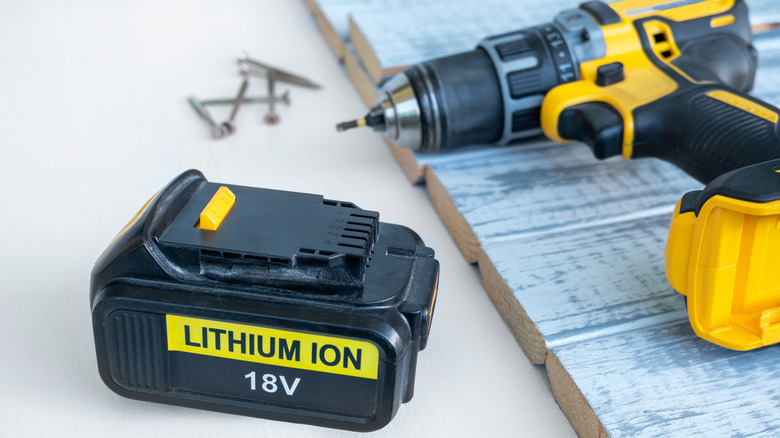3 Telltale Signs Your Power Tool Battery Needs To Be Replaced
There's no shortage of power tool brands on the market, with a wide assortment of models and types to choose from. And if you own any cordless tools, you're most likely familiar with the need for specialized, rechargeable batteries such as the Ryobi 18V.
Power tool batteries come in various shapes, sizes, and voltages, with those made for specific brands generally usually (but not always) working with most of their own hardware. Though they may not look the same as or fit into electronics that use AAs, nine volts, etc, they will inevitably start to fail.
You can usually expect to get about one to three years of life out of your tools' batteries, with some exceptions depending on the battery itself, so if enough time passes, they may simply run out of juice. Where batteries are stored can also impact performance and longevity, so try to keep them out of extreme temperatures and away from moisture as best you can. Using off-brand batteries carries the risk of a reduced lifespan as well, and sometimes, a battery can just fail on its own, regardless of the manufacturer's age.
No matter the reason, your power tool's battery is bound to need a replacement at some point in the future, so it's a good idea to know what to keep an eye out for.
The three biggest signs
If you suspect your battery might need to be replaced, here are the main things you should check before going out to buy a replacement:
- Connect the battery to its charger for the recommended amount of time for a full charge (consult the manual if you're unsure), and wait until enough time has passed to reconnect it to your tool and test it out. If the tool doesn't turn on or if the charge runs down too quickly, the battery may have gone bad or expired.
- Try fully charging the battery (see above) and then connecting it to a multimeter to check the voltage. If the multimeter shows a number less than the battery's intended voltage (which should be visible somewhere on the battery itself), then you probably need a new one.
- If you see anything that looks like smoke coming out of your battery, or if the battery feels like it's overheating when in use, stop using it immediately. Disconnect the battery, dispose of or recycle it properly (according to your area's laws), and acquire a replacement.
Something to keep in mind with all of this is that sometimes the tool may be the problem rather than the battery. So, if you perform an initial charge test and things aren't working, you may want to double-check with a multimeter or try the battery with a different (but compatible) tool just to make sure the battery is at fault.

